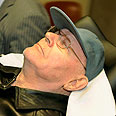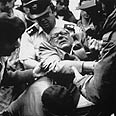
Demjanjuk. Putting on a show?
Photo: AP

Demjanjuk in Israel
Photo: AP
"The evidence we have existed when the trial was underway in Israel. But, for some reason, the Israelis chose to focus on Treblinka. If they had focused on Sobibor, they could have convicted Demjanjuk," said Cornelius Nestler, one of the prosecutors in the trial of John Demjanjuk currently underway in Germany.
Nestler still finds it hard to understand how Israel did not convict Demjanjuk. In a conversation with Ynet, the prosecutor, who is representing 10 families, explained their claims that this man is responsible for sending thousands of Jews to their death at the Nazi's Sobibor extermination camp.
War Crimes
Holocaust survivors see former Nazi guard's trial as platform to remind world of gas chambers
In response to the question how the defense intends to convict Demjanjuk, who was already acquitted in Israel because the prosecution failed to prove their claims beyond a reasonable doubt, Nestler said that he has enough evidence and testimonies to prove that Demjanjuk took an active role in murdering Jews at Sobibor.
"We have enough evidence collected from eye witnesses during other trials in Russia, testimonies that make a clear picture that Demjanjuk forced Jews who arrived in trains at Sobibor to undress and then shoved them into the gas chambers," he said.
According to the prosecutor, the fact that many of the witnesses are no longer alive will not prevent the prosecution from proving their claims. "Even without these testimonies, we have enough evidence – not just his identity cards, but also lists that prove he was at Sobibor. This evidence existed already during the trial in Israel, but for some reason, the Israelis chose to focus on Treblinka.
"There is much stronger evidence for Sobibor, and it all existed then, too."
No hearing was held on Wednesday at the Munich courthouse after a doctor said Demjanjuk was too sick to appear in court. Nestler does not doubt the doctor's ruling, but is angered that Demjanjuk is able to present himself to the world as a weak, suffering, and sick man.
"We all saw the show he put on. When the judge is present, he plays the sick old man. But as soon as he senses that no one is looking at him, he sits up, moves, speaks with his lawyer. The doctors have already clarified a number of times that he is not that sick.
"There is no real reason for him to be brought into the courtroom on a stretcher and to remain lying down during the trial. He was given the opportunity to come across as pitiable, and he is unashamedly taking advantage of this. Under other circumstances, we would protest this. The only reason we decided to allow this situation is that we just wanted to trial to start already," explained Nestler.
From the prosecution's perspective, the defendant's health is not supposed to affect the outcome of the trial: "The prosecutors lost their families and will take this pain with them to the grave. He needs to grapple with his deeds until the end of his days. Anyone who took part in the Holocaust needs to stand trial. The fact that he is elderly doesn't matter."
For people observing the trial from afar, a one-day break does not seem that significant, explained Nestler. However, for the prosecution, this was a big disappointment. "Fifteen of the prosecutors were supposed to testify yesterday. Most of them didn't sleep at night. The events they are about to recount are difficult ones – it is difficult for them to speak about their loss. Of course, when they heard that the hearing was delayed, it affected them. Some of them are really destroyed," he said.
Demjanjuk not victim – he had choice
And what of the defense's claims made on the first day of the trial that Demjanjuk is a victim just like the victims of the Holocaust who suffered in the extermination camps? This assertion infuriates the prosecution.
"This is not at all correct. Historians that will speak during the trial will show that Demjanjuk had many opportunities to leave. They allowed him to spend weekends outside of the camp. He received vacations. There were a lot of guards who disappeared and returned to the Ukraine and Poland. To call him a victim like the Jews who collaborated with the Nazis in order to save their lives is simply outrageous. They did not murder – he did," explained Nestler.
But will this be enough to prove that Demjanjuk was at Sobibor? Nestler believes the answer is affirmative: "Every guard who served in Sobibor took part in the murders. All the historians agree. If you were there, you were part of the extermination machine. It is that simple."
The claim that Demjanjuk was just a "cog in the machine" is not accepted by the prosecution: "This essentially is a vindication for past mistakes. The courts failed after World War II. Rudolph Hoess, an Auschwitz commander, was convicted of 'aiding a crime.' Mistakes of the past cannot justify not serving justice today."
Ultimately, Nestler believes, "It is inconceivable that Jews who lost their parents and siblings will pay for the non-functionality of the German court system."















